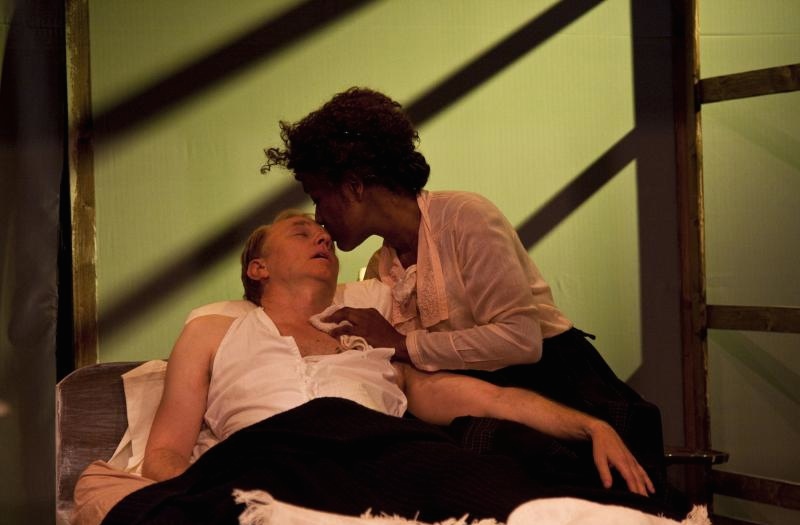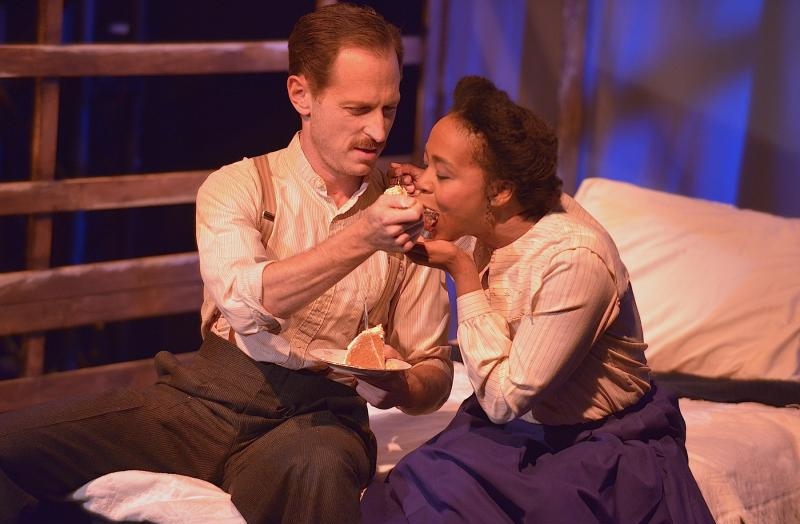Antaeus Presents A Searing Production Of ‘Wedding Band’

The tide of gay marriage continues to sweep the nation amidst significant intolerance and resistance, while racial tension, distrust, and discord in places like Ferguson, MO expose the continuing ignorance and inequality in our nation. Antaeus, then, has chosen a particularly pertinent time to mount a production of the frank and searing “Wedding Band.” Though it could be argued that given our nation’s history, there is probably no time that “Wedding Band” could not resonate with contemporary issues and concerns.
The play, directed by Gregg T. Daniel, is set in South Carolina in 1918, and it follows the story of Julia (Veralyn Jones), a black seamstress, and Herman (Leo Marks), a white baker as they celebrate their tenth anniversary. They desperately yearn to be married, but they are held apart by society’s laws and prejudices as they struggle to make their love survive amidst ignorance and hate. They face the daunting obstacles of the prejudices of their neighbors and families, as well as the specter of World War I and the Spanish Influenza epidemic.
SEE ALSO: An Evening With Alan Cumming: His Career, His Upbringing, His Memoir
The play gets off to a slow start, bogged down in exposition and the introduction of numerous characters. The audience is introduced to so many faces and names at once that it takes awhile to set everyone straight and know exactly who they’re talking about at any given moment. However, the second act is a searing piece of theater that grips us from its first moments in its intensity and does not let go until long after the lights come up on the house.
The second act is where the play fully explores its love-hate dichotomy, pushing Julia to a breaking point caught between her own dignity and self-respect for her race and her overwhelming love for Herman. It introduces Herman’s mother (Anne Gee Byrd) and sister (Belen Greene) who bring the audience face to face with the deep-seated racism and hatred of the early 20th century South. When Herman’s mother declares that she’d “rather be dead than disgraced,” she showcases how entrenched and blinding her—and by extension society’s—prejudices are.

This dance sequence is just one of a surprising number of musical elements. The play is knit together by music, particularly the singing of its female cast. They open the show with traditional African American spirituals and continue to use them as transitions and thematic underscoring throughout. The music is effective for creating a strong sense of time and place, but also because it highlights themes of family, kinship, and heritage through linking these women to their enslaved ancestors who originated these songs.
This all exists within a stellar sound design (Jeff Gardner) that creates an evocative and powerful ambience throughout the production. Through music and use of sound effects, this small town in South Carolina comes to life vibrantly. This is all helped by the set (Francois-Pierre Couture), lights (Michael Gend), and costumes (A. Jeffrey Schoenberg) that do not call attention to themselves, but rather are powerful in their simplicity. Antaeus mounts their productions in a small, black-box theatre, but they always manage to create a strong sense of time and place within a tiny space through the power of suggestion and talented designers.
SEE ALSO: Oh, What A Night With 'Jersey Boys' At The Pantages
Finally, the production is marked by strong performances from the entire cast. Antaeus is a notable theater company for their tradition of partner casting. In all of their productions, they cast two actors in each role with ensembles alternating performances. On Thursday and Friday evenings, they intermix the two casts, keeping actors on their toes as they play opposite new partners and in ever-changing combinations. The “Wedding Band” casts are called the “Honey Bunches” and “Sweet Potatoes,” but the production I saw featured a mixed ensemble named the “Dear Hearts.”
Veralyn Jones and Leo Marks, as Julia and Herman, deftly lead a strong ensemble, and their performances as the couple at the heart of the play are nuanced and beautiful. Jones brings an immense inner strength to Julia, a woman who has had to continually uproot her life as her race rejects her for loving a white man. She also brings a raw vulnerability to the character, especially in moments when Julia struggles to choose between her love for Herman and her desire to belong to her race, as her people and kin. Marks is an equal match for Jones, as he presents us with a man ravaged by illness and the pressures of society. His physicality and southern dialect make Herman a distinct and intriguing presence while still maintaining utter honesty in the role. His love for Julia, as he presents it, is ferocious and that power is staggering when audiences are so close to the action in this small theater.

Though “Wedding Band” has a slow first act, it is still a must-see production. Besides the inherent strengths of this production’s cast and design, it’s also just a chance to see a controversial classic of the American theater in a rare staging. While it brings questions of prejudice and race to the table, the play is ultimately about the power of love in this world and how it can make people feel like they belong. When evaluating her ten years with Herman, Julia reflects that there “ain’t too many people in this world that get to be truly loved.” An achingly sad, but true pronouncement that reminds us that when it comes to the ones we truly love, the fight is always worth it.
“Wedding Band” is playing at Antaeus (5112 Lankershim Blvd., North Hollywood) through December 7th. Tickets are $30-$34. For more information visit Antaeus.org
Contact Contributor Maureen Lee Lenker here or follow her on Twitter @maureenlee89.
For more Theater & Dance coverage click here.



